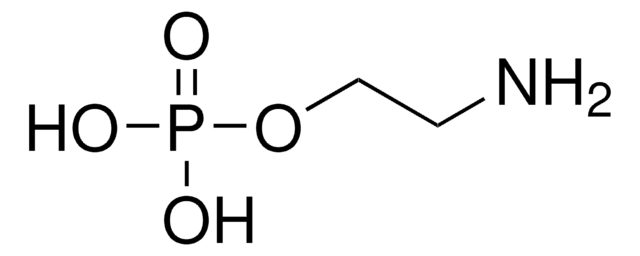推薦產品
品質等級
化驗
≥99.0%
形狀
powder or crystals
儲存條件
dry at room temperature
技術
HPLC: suitable
顏色
white
pH值
9—10
pKa (25 °C)
9.5
mp
82-84 °C (lit.)
溶解度
water: 0.33 g/mL, clear, colorless to very faintly yellow
密度
1.07 g/cm3 at 20—25 °C
1.12 g/cm3 at 20—25 °C
適合性
suitable for chromatography
應用
general analytical
life science and biopharma
pharmaceutical
SMILES 字串
NCCO.[H]Cl
InChI
1S/C2H7NO.ClH/c3-1-2-4;/h4H,1-3H2;1H
InChI 密鑰
PMUNIMVZCACZBB-UHFFFAOYSA-N
尋找類似的產品? 前往 產品比較指南
一般說明
盐酸乙醇胺是生物化学和分子生物学领域的一种多用途化合物,在多个研究领域发挥着关键作用。它主要发挥缓冲剂作用,确保对酶促反应、蛋白质溶解和其他生物过程至关重要的稳定pH环境。其重要作用还延伸到膜蛋白研究领域,可帮助从细胞膜中提取此类蛋白质。此外,这一物质还可用于细胞培养及用作生物样品制备试剂,简化核酸和蛋白质分离工艺,帮助通过蛋白质印迹和免疫组织化学方法检测蛋白质。这种化合物的广泛应用使其在生化研究中不可或缺,可帮助完成各种实验方案并增进我们对分子生物学、免疫学和细胞生物学等领域的理解。
應用
盐酸乙醇胺已用于:
- 过夜孵育原子力显微镜针尖,将伯胺基团结合到针尖表面上
- 制备来源于MMTV-HER2转基因小鼠乳腺肿瘤的人表皮生长因子受体2(HER2)细胞的DMEM(杜氏改良Eagle培养基)/F-12培养基
- 加到培养物中,研究其对内源性磷脂酰乙醇胺池和自噬过程的影响
- 在使用原子力显微镜研究生物系统中的分子相互作用和粘附力中,用作研究试剂
- 制备用于表面增强激光解吸电离分析的试剂,以研究白细胞介素的作用
生化/生理作用
盐酸乙醇胺可被系统发育上不同的细菌作为碳源和氮源利用。它在细菌和哺乳动物细胞膜中以磷脂酰乙醇胺的形式存在。乙醇胺解氨酶负责将乙醇胺降解为乙醛和氨。乙醇胺可在光合生物模型中促进脂质蓄积。
特點和優勢
- 适用于免疫学、细胞生物学和生化研究
- 经测试确认重金属污染水平较低,确保适用于各种应用
- pKa为9.5 (25 °C)的有效缓冲剂
訊號詞
Warning
危險分類
Acute Tox. 4 Dermal - Acute Tox. 4 Inhalation - Acute Tox. 4 Oral - Aquatic Chronic 3 - Eye Irrit. 2 - Skin Irrit. 2 - STOT SE 3
標靶器官
Respiratory system
儲存類別代碼
11 - Combustible Solids
水污染物質分類(WGK)
WGK 1
閃點(°F)
Not applicable
閃點(°C)
Not applicable
個人防護裝備
dust mask type N95 (US), Eyeshields, Gloves
客戶也查看了
K C Andree et al.
Lab on a chip, 19(6), 1006-1012 (2019-02-15)
The load of circulating tumor cells (CTC) is related to poor outcomes in cancer patients. A sufficient number of these cells would enable a full characterization of the cancer. An approach to probe larger blood volumes, allowing for the detection
Foodborne Diseases: New Insights for the Healthcare Professional, 14-14 (2012)
Selective cyclin-dependent kinase 2/cyclin A antagonists that differ from ATP site inhibitors block tumor growth
Mendoza N, et al.
Cancer Research, 63(5), 1020-1024 (2003)
Amino Alcohols-Advances in Research and Application, 29-29 (2013)
Keiji Uchiyama et al.
International journal of molecular sciences, 22(21) (2021-11-14)
Prion diseases are a group of fatal neurodegenerative disorders caused by accumulation of proteinaceous infectious particles, or prions, which mainly consist of the abnormally folded, amyloidogenic prion protein, designated PrPSc. PrPSc is produced through conformational conversion of the cellular isoform
我們的科學家團隊在所有研究領域都有豐富的經驗,包括生命科學、材料科學、化學合成、色譜、分析等.
聯絡技術服務




